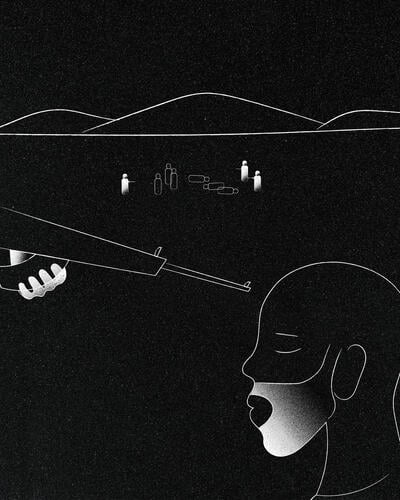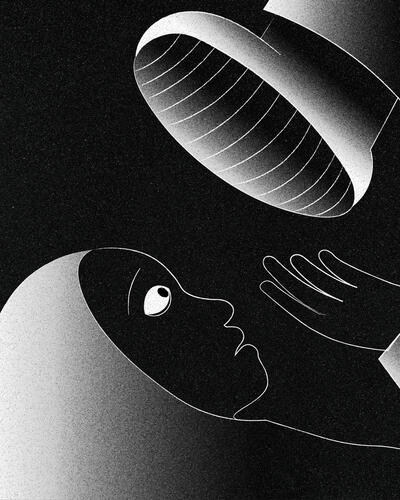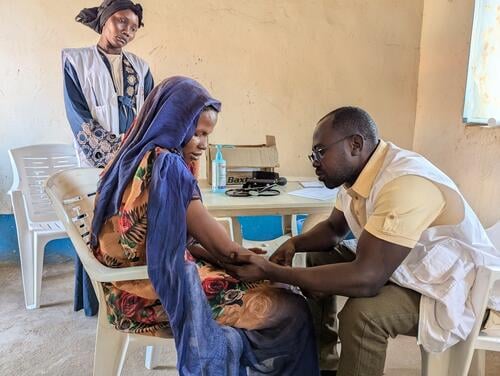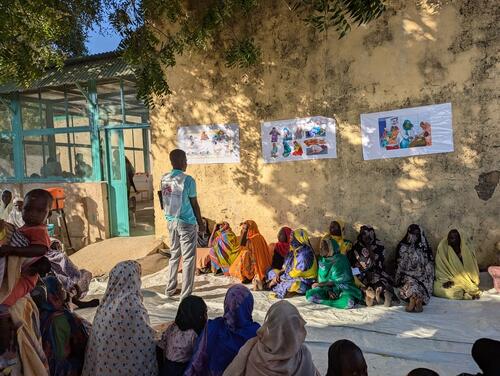Stories of Violence and Forced Displacement from South Kordofan, Sudan
Millions of displaced Sudanese struggle for survival as conflict and hunger grip South Kordofan
Illustrations to depict the testimonies of people who have fled to Sudan’s Nuba mountains in search of safety from the ongoing conflict, March 2025.
Since the war between the Sudanese Armed Forces and the Rapid Support Forces started in April 2023 and spread across Sudan, it is estimated that 11 million people have been internally displaced.
In the southern state of South Kordofan, where the Nuba mountains area is located, hundreds of thousands of displaced people are seeking refuge, according to the Sudanese Relief and Rehabilitation Agency.
Before the war started, the region already experienced waves of displacement during the decades of conflict between the Sudan People’s Liberation Movement-North (SPLM-N) and the Sudanese government. Many people have been displaced multiple times.
Médecins sans Frontières (MSF) currently provides medical care and essential everyday items to the displaced people who arrive daily.
Testimonies collected from displaced people in five camps where MSF works show the harrowing situation they have lived through and the challenges they continue to face.
“They attacked early morning. We took what we could and fled. We lost two of my children on the way. Up to now I don’t know where they are, there is no phone,” explains a woman who walked five days without food until she and her family were able to reach Al Hadra, South Kordofan.
An airplane bombed and killed her 15-year-old daughter there. “It was the first time I saw bombings. I was in the bush collecting wood for shelter. My daughter had gone to the borehole to fetch water for us. I rushed to my tent and later they [the villagers] brought my daughter’s body to me.”
Another woman explains how they managed to survive in Dilling district, South Kordofan.
“We went to the forest every night to sleep and use the river as protection. We leaned on the riverbank so that the bullets would not hit us,” she says.
“When the shootings stopped, we would rush to the house to get food and water for the children. During an attack I saw a mother who was breastfeeding…
… They took her boy and threw him away. If you tried to confront them, they could hit you, even shoot the child. For them the boy would grow up and fight back.”
We went to the forest every night to sleep and use the river as protection. We leaned on the riverbank so that the bullets would not hit us.A DISPLACED WOMAN
The area of the Nuba mountains is largely controlled by the SPLM-N. The influx of people arriving in the region, which is considered safer than other parts of the country, has had an impact on local communities as well.
The poor harvest in 2023 combined with difficulties in accessing basic services and a lack of humanitarian assistance led to widespread hunger during the lean season both inside and outside the camps where displaced people are living.
MSF teams working on the ground report many people in need of healthcare, food and water.
“When the war broke out, we lost everything. When I arrived at the camp, I did not have milk to breastfeed. My child was sick and kept on crying. I gave him herbs and prayed to God,” says another woman.
One man explained that soldiers entered Habila, North Kordofan, to kill all the “black people”.
“The moment they entered Habila they captured a big part of my family: 13 people, all men. The militia gathered them in one house and shot them all. I ran away,” he says.
He fled to Tungul, South Kordofan where he received some food but where no health service was available, so he fled again.
“From Tungul I went to Korgul displaced camp. Here things are calm. I feel safe. We want to stay here. But we suffered during the rainy season when there is no food – my children got malnourished but none of them died.”
A DISPLACED MAN: The moment they entered Habila they captured a big part of my family: 13 people, all men. The militia gathered them in one house and shot them all. I ran away.

For women fleeing violence, access to healthcare is challenging as explained by one woman.
“I was in the market when they came. I tried to defend myself, but they abused me, and beat my chest,” she says.
“I still feel the pain today. After the torture I tried to get treatment, but I did not have money to do an x-ray.”
“I have spent two days without eating anything. I was collecting leaves to cook them. I had to sneak out in the bushes to avoid checkpoints to get medical care in Hajar Jawad,” says another woman.
“During the rainy season, my child and I had malaria, we received treatment in the clinic in Hajar Jawad [an MSF clinic] for malaria and malnutrition.”
A DISPLACED WOMAN: I was in the market when they came. I tried to defend myself, but they abused me, and beat my chest. I still feel the pain today.

MSF runs activities in Dalami locality and Western Jebel. In Dalami locality, our teams support Tujur hospital with emergency room and maternity services, malnutrition care, and male and female in-patient wards.
Since the start of the project in 2024, MSF conducted 21,338 outpatient consultations, with 593 admissions. Teams treated 8,054 cases of malaria (38 per cent of all cases).
The teams have assisted 102 births and carried out 1,788 sexual and reproductive health consultations. In our mobile clinics that included Um Heitan, MSF has carried out 3,335 outpatient consultations.
We have also been supporting health centres, conducting mobile clinics in camps for internally displaced people, and distributing essential items in Western Jabel, but the unstable security situation has made the delivery of medical services challenging.
Our teams in the Nuba mountains observe an extremely inconsistent and insufficient coverage of basic and specialised healthcare. Where care is available, it is often inaccessible due to distance and insecurity.
Moreover, there is an almost complete lack of protection services which is particularly concerning given the levels of violence people have experienced or witnessed, the separation of families, and the lack of shelter many people face.


Source: https://human-wrongs-watch.net/2025/04/15/stories-of-violence-and-forced-displacement-from-south-kordofan-sudan/
Anyone can join.
Anyone can contribute.
Anyone can become informed about their world.
"United We Stand" Click Here To Create Your Personal Citizen Journalist Account Today, Be Sure To Invite Your Friends.
Before It’s News® is a community of individuals who report on what’s going on around them, from all around the world. Anyone can join. Anyone can contribute. Anyone can become informed about their world. "United We Stand" Click Here To Create Your Personal Citizen Journalist Account Today, Be Sure To Invite Your Friends.
LION'S MANE PRODUCT
Try Our Lion’s Mane WHOLE MIND Nootropic Blend 60 Capsules
Mushrooms are having a moment. One fabulous fungus in particular, lion’s mane, may help improve memory, depression and anxiety symptoms. They are also an excellent source of nutrients that show promise as a therapy for dementia, and other neurodegenerative diseases. If you’re living with anxiety or depression, you may be curious about all the therapy options out there — including the natural ones.Our Lion’s Mane WHOLE MIND Nootropic Blend has been formulated to utilize the potency of Lion’s mane but also include the benefits of four other Highly Beneficial Mushrooms. Synergistically, they work together to Build your health through improving cognitive function and immunity regardless of your age. Our Nootropic not only improves your Cognitive Function and Activates your Immune System, but it benefits growth of Essential Gut Flora, further enhancing your Vitality.
Our Formula includes: Lion’s Mane Mushrooms which Increase Brain Power through nerve growth, lessen anxiety, reduce depression, and improve concentration. Its an excellent adaptogen, promotes sleep and improves immunity. Shiitake Mushrooms which Fight cancer cells and infectious disease, boost the immune system, promotes brain function, and serves as a source of B vitamins. Maitake Mushrooms which regulate blood sugar levels of diabetics, reduce hypertension and boosts the immune system. Reishi Mushrooms which Fight inflammation, liver disease, fatigue, tumor growth and cancer. They Improve skin disorders and soothes digestive problems, stomach ulcers and leaky gut syndrome. Chaga Mushrooms which have anti-aging effects, boost immune function, improve stamina and athletic performance, even act as a natural aphrodisiac, fighting diabetes and improving liver function. Try Our Lion’s Mane WHOLE MIND Nootropic Blend 60 Capsules Today. Be 100% Satisfied or Receive a Full Money Back Guarantee. Order Yours Today by Following This Link.






